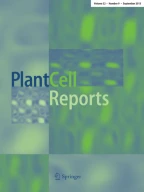Abstract
Bioelastic protein-based polymers (PBP) have several medical (prevention of post-surgical adhesions) and non-medical (biodegradable plastic) applications. This study compares expression levels of PBP genes (synthetic) integrated into the nuclear genome or the large single-copy (LSC) or inverted repeat (IR) region of the chloroplast genome in transgenic tobacco plants. Polymer transcripts accumulated up to 100-fold higher in the IR plants than in those of nuclear transgenic plants. Integration of foreign genes into all of the chloroplast genomes (homoplasmy) and higher levels of polymer transcripts were observed only in the IR and not in LSC transgenic plants. Expression of the polymer protein was further confirmed by Western blot analysis.
Similar content being viewed by others
Author information
Authors and Affiliations
Additional information
Received: 13 November 1998 / Revision received: 8 January 1999 / Accepted: 17 April 1999
Rights and permissions
About this article
Cite this article
Guda, C., Lee, SB. & Daniell, H. Stable expression of a biodegradable protein-based polymer in tobacco chloroplasts. Plant Cell Reports 19, 257–262 (2000). https://doi.org/10.1007/s002990050008
Issue Date:
DOI: https://doi.org/10.1007/s002990050008
